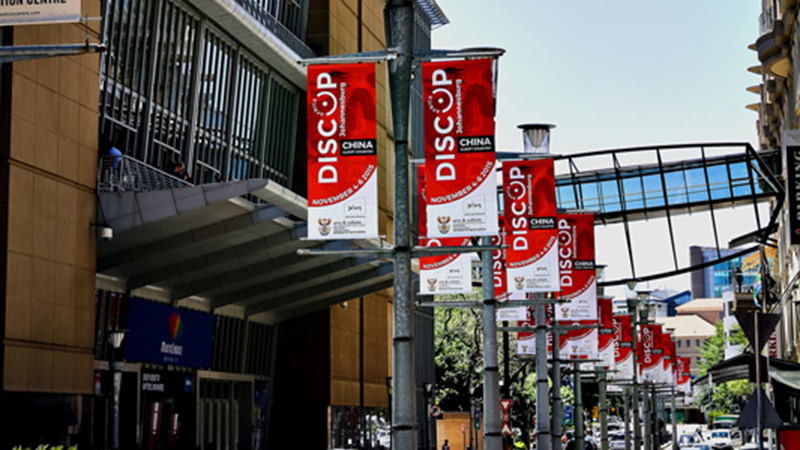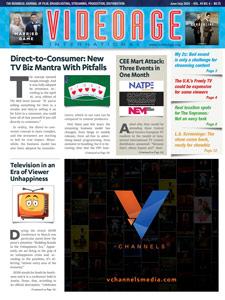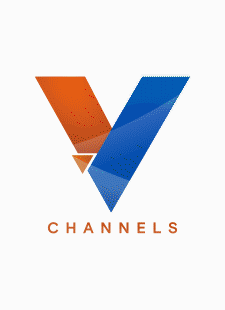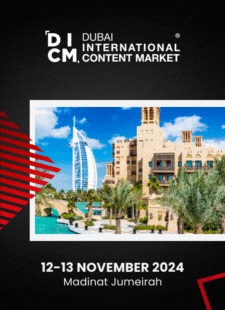Discop Johannesburg is now entering its fifth year. The event, to be held in its usual venue, the Sandton Convention Center, is expecting 250 exhibition companies eager to enter or continue serving a developing, but fast-growing TV marketplace.
This year, the three-day market dates are a bit problematic because the event starts November 2, just 12 days after MIPCOM in Cannes. To aggravate the matter, it runs concurrently with the American Film Market in Santa Monica, California and just four days after the NAB Show New York. But while the latter is mostly hardware and audience data-related, the former has the kind of exhibitors who would benefit from a group of Sub- Saharan African buyers who rarely attend other international markets.
Africa and other developing TV markets are the bread and butter of Discop’s organizer, Basic Lead’s Patrick Zuchowicki Jucaud, who, in addition to Discop Johannesburg, runs Discop in Abidjan, Ivory Coast; Discop Dubai in the United Arab Emirates, and Discop Istanbul, even though the Turkish market will skip 2017 to reappear the following year.
Zuchowicki Jucaud entered the African TV market in 2008 with trade shows in Dakar, Senegal; Nairobi, Kenya; Accra, Ghana; Johannesburg, South Africa, and Abidjan, Ivory Coast. So far, he has organized a total of 14 markets in the continent and, early next year, he will venture into the Middle Eastern TV market with Discop Dubai.
Micheline Azoury of Italy’s Mondo TV, who has never missed an edition of Discop Africa, said, “Johannesburg is different because producers and distributors are coming from all over the world.
Zuchowicki Jucaud sees Discop Africa as a Sub-Saharan region with 48 countries and 250 TV buying companies looking for blockbuster films, U.S. TV series, Bollywood and Nollywood content, game shows and sports. Program acquisition prices range from U.S.$100 an hour up to U.S.$5,000. But according to a Latin American Discop Johannesburg exhibitor, FTA fees go as low as $100 and up to $1,500 per hour, which are typical of developing TV territories, reminiscent of the early years of the liberated Eastern European and CIS TV markets. In order to compensate for the low license fees, some content distributors sell on a non-exclusive basis; others, such as Roxanne Barcelona, vp of the Philippines’ GMA Worldwide, sell their series in packages.
Added Azoury, “besides a large library, Mondo TV has content available in French, English, Portuguese and Arabic, which helps to structure a volume deal with broadcasters with small acquisition budgets.”
Some distributors set the license fees by dividing the region into four areas: the richer English-speaking Eastern zone, the poorer French-speaking Western zone, South Africa and the Portuguese-speaking area.
South Africa has the largest TV market in Africa, with its entertainment and media industry generating the equivalent of U.S. $9.3 billion in 2015 and total entertainment and media advertising revenue of $3.2 billion.
Sales of programs in French have special considerations, since some 97 million people speak the language. Recently, however, English is gaining ground with countries such as Rwanda, Burundi and Gabon switching from French to English, making English the official language in 26 African countries. Other languages spoken in the region are Portuguese (five countries) and Spanish (one country). Programs acquired have to be either in French or English, or dubbed in one of those languages, since most buyers cannot afford dubbing costs. As explained by GMA’s Barcelona, “most of our clients in Sub Saharan
Africa prefer that the material be already dubbed in English.”
About 200 African buying companies, represented by some 500 executives, attend Discop in Johannesburg, where the Sandton Convention building is conveniently located in the town center, surrounded by hotels with capacity of 11,000 rooms.
The market offers 180 booths accommodating some 250 companies, including the Chinese Pavilion and a new entry this year, the American Umbrella. The pavilion consists of stand space and the umbrella of just meeting tables.
In terms of efficiency, each exhibitor is expected to meet, on average, between eight and 12 buying companies (excluding pan-regionals) a day and, if able to offer long series, at the end of the market the exhibitor can come up with sales in the $50,000-$200,000 range. In this respect, Discop tends to be a more efficient “point of purchase,” compared to a market-by-market sales call.
According to New York City-based Bruce Rabinowitz, who has attended numerous editions of Discop as head of Distribution for Discovery Learning Alliance, more than half of his meetings end up in a licensing deal.
Plus, many programs are given for free or on a discount basis, just to get exposure.
Rabinowitz reported that, “as compared to earlier editions of Discop, African buyers now show a greater level of seriousness as to program acquisitions, and are more likely to keep scheduled appointments and actively participate in follow-up after the market, via email and phone, than they had at any time in the past.”
Contracts with local TV stations are usually written in order to obtain 50 percent of the license fee before getting material, with the balance paid up to 60 days after delivery. And, added a Latin American distributor, “the big companies are good clients and they pay on time.” However, there are reports that collections are slow and some small TV outlets pay in local currencies (instead of the preferred U.S. dollar or euro) also due to currency exchange issues.
In terms of the market’s outlook, the Sub- Saharan region is served by 250 TV broadcasters (80 percent privately owned) offering some 400 TV channels to 58 million TVHH. Of these, 14 million receive TV via satellite and 11 million are pay-TV subscribers, who generate the equivalent of U.S.$3.5 billion a year in total revenues.
The pay-TV market is mainly controlled by a few players: DSTV (the market leader with 38 percent market share), owned by the Cape Town-based Naspers Group; the Beijing-based StarTimes; the Dar Es Salaam-based Azam TV, owned by Said Salim Bakhresa, and Nairobi-based Zuku TV, owned by the Wananchi Group.
Plus, Nigeria is also covered by a few local pay-TV services. Reportedly, programming costs represent 20 percent of the pay-TV market revenues.
Additionally, ten pan-regional networks are active in the region. They are mostly part of U.S. TV groups, which are also acquiring content from independent distributors.
Even though local production is increasing, imports make up most of the local TV schedules. Excluding sports and news, which takes a big chunk of airtime, 90 percent of programming schedules comes from imports: both regionally and outside Africa. It is estimated that imports (outside sports) represent 1.2 million programming hours per year, which translate to an import market valued at $1 billion a year, of which $250 million come from FTA stations.
Regional production imports come mainly from South Africa, Nigeria, Ivory Coast, Senegal, Tanzania and Kenya, which have fast-growing local TV content production industries.
Concluded Mondo TV’s Azoury: “There is a strong request for local animated series based on local stories, but they are very hard to find. We welcome investors’ interests to produce series based on African tales or characters.”
Audio Version (a DV Works service)










Leave A Comment